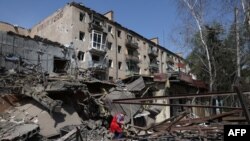ຢູ່ໃນເຂດຊາຍແດນໄທຕິດກັບມຽນມາ ພວກອົບພະຍົບກະຫລ່ຽງຫຼາຍພັນຄົນປະເຊີນກັບ ການຖືກສົ່ງກັບຄືນປະເທດ ໃນຂະນະທີ່ການຢຸດຍິງ ລະຫວ່າງທະຫານລັດຖະບານແລະ ກຳລັງປະກອບອາວຸດ ຂອງພວກຊົນກຸ່ມນ້ອຍທີ່ແຍກໂຕອອກ ຍັງດຳເນີນຢູ່ຕໍ່ມາ. ແຕ່ບັນ ຫາຄວາມປອດໄພ ແລະບັນຫາເລື່ອງດິນ ຍັງສືບຕໍ່ເປັນອຸບປະສັກທີ່ສຳຄັນ ຂັດຂວາງຂັ້ນ ຕອນ ໃນການຈັດສົ່ງພວກອົບພະຍົບກັບຄືນໄປ. Steve Stanford ມີລາຍງານ ກ່ຽວກັບ ເລື່ອງນີ້ ຈາກລັດກະຫລ່ຽງ ໃນປະເທດມຽນມາ ດັ່ງໄພສານ ຈະນຳມາສະເໜີທ່ານໃນອັນ ດັບຕໍ່ໄປ.
ທີ່ລັດກະຫລ່ຽງ ປະເທດມຽນມາ ກຳລັງປະກອບອາວຸດ ຂອງພວກຊົນກຸ່ມນ້ອຍ ຍັງສືບຕໍ່ ທຳການປ້ອງກັນຢູ່ຕາມເຂດນ້ອຍໆຫລາຍແຫ່ງທີ່ທະຫານລັດຖະບານຍັງບໍ່ທັນສາມາດ ຄວບຄຸມໄດ້ເທື່ອ.
ໃນບັນຫາຂັດແຍ້ງທີ່ດຳເນີນມາເປັນເວລາດົນກວ່າ 6 ທົດສະວັດແລ້ວນັ້ນກຳລັງປະກອບ ອາວຸດຂອງພວກຊົນກຸ່ມນ້ອຍຫຼາຍໆຈຸ ຍັງສືບຕໍ່ປ້ອງກັນດິນແດນທີ່ອຸດົມສົມບູນໄປດ້ວຍ ຊັບພະຍາກອນຂອງຕົນ.
ທ້າວ Saw Nay Lay ສະມາຊິກກອງກຳລັງປ້ອງກັນຊາດກະຫລ່ຽງ ກ່າວວ່າ “ເຫດຜົນທີ່ ຂ້ອຍຕ້ອງຈັບປືນຂຶ້ນສູ້ ແລະກາຍມາເປັນທະຫານ ກໍຍ້ອນວ່າ ຂ້ອຍບໍ່ຢາກເຫັນທະຫານ ມຽນມາທຳລາຍປະຊາຊົນກະຫຼ່ຽງຂອງພວກເຮົາ. ຂ້ອຍຢາກຂ້າທະຫານມຽນມາທັງໝົດ ເພື່ອປົກປ້ອງບ້ານເຮືອນຂອງເຮົາ.”
ພວກອົບພະຍົບກະຫລ່ຽງກ່າວວ່າ ເຂົາເຈົ້າກຳລັງໄດ້ຮັບອາຫານໜ້ອຍລົງຢູ່ໃນສູນຕ່າງໆ ແຕ່ວ່າທາງເລືອກໃນການທີ່ຈະກັບຄືນໄປບ້ານເກີດນັ້ນແມ່ນຍັງບໍ່ທັນເປັນທີ່ຈະແຈ້ງເທື່ອ.
ໃນເດືອນຕຸລາປີກາຍນີ້ ມີອົບພະຍົບ 96 ຄົນຖືກສົ່ງກັບຄືນໄປມຽນມາໂດຍທາງລົດເມໃນ ໂຄງການນຶ່ງ ທີ່ຈັດຂຶ້ນໂດຍ ລັດຖະບານຂອງ ທ່ານນາງອອງຊານ ຊູຈີ ແຕ່ຍ້ອນບໍ່ມີການ ວາງແຜນ ໃນການຈັດຫາວຽກເຮັດງານທຳແລະບ່ອນຢູ່ອາໄສໃຫ້ແກ່ພວກທີ່ຖືກສົ່ງກັບຈຶ່ງ ໄດ້ກໍ່ໃຫ້ເກີດມີຄວາມວິຕົກກັງວົນຂຶ້ນມາ.
ທ່ານ Saw Robert Htway ເຈົ້າໜ້າທີ່ໃນຄະນະກຳມະການອົບພະຍົບກະຫຼ່ຽງກ່າວວ່າ “ອົບພະຍົບຫລາຍໆຄົນ ຢາກອາສາສະໝັກກັບຄືນປະເທດ ແຕ່ ພວກເຮົາແມ່ນຈຳເປັນ ຕ້ອງໄດ້ຮັບການສະໜັບສະໜຸນ ຫຼັງຈາກກັບຄືນໄປເຖິງ ທີ່ນັ້ນແລ້ວ. ຖ້າຫາກພວກເຂົາ ເຈົ້າບໍ່ໃຫ້ການຊ່ອຍເຫລືອ ດ້ວຍການມອບດິນຫຼືບ່ອນໃຫ້ພວກເຮົາຢູ່ ພວກເຮົາກໍຈະປະ ເຊີນກັບຫລາຍໆບັນຫາ. ບັນຫາເລື່ອງດິນເປັນບັນຫາໃຫຍ່.
ມັນເປັນການສະແດງຄວາມເປັນຫ່ວງຂອງຫລາຍໆຄົນ ທີ່ຢູ່ໃນສູນຕ່າງໆ ຊຶ່ງບາງຄົນໄດ້ ໃຊ້ຊີວິດສ່ວນໃຫຍ່ ຢູ່ທີ່ນັ້ນ ເຊັ່ນລຸງ Saw Ai Say.
ລຸງ Saw Ai Say ກ່າວວ່າ “ເຮືອນເກົ່າຂອງຂ້ອຍ ໄດ້ຖືກທຳລາຍ ໂດຍທະຫານມຽນມາ. ຖ້າຂ້ອຍຕ້ອງໄດ້ກັບຄືນໄປ ຂ້ອຍຕ້ອງໄດ້ ສ້າງສາທຸກສິ່ງຢ່າງຄືນໃໝ່. ຂ້ອຍເຖົ້າເກີນໄປ ແລ້ວ ກວ່າທີ່ຈະເລີ້ມຄືນໃໝ່ໄດ້ອີກ. ຂ້ອຍບໍ່ສາມາດເຮັດໄດ້.”
ສ່ວນບຸກຄົນອື່ນໆ ກໍມີຄວາມເປັນຫ່ວງ ຢ້ານວ່າ ເວລາໃດທີ່ເຂົາເຈົ້າເລືອກເອົາການເດີນ ທາງກັບຄືນບ້ານເກີດແລ້ວ ເຂົາເຈົ້າກໍຈະບໍ່ສາມາດ ໄດ້ຮັບການສະໜັບສະໜຸນ ຈາກສູນ ອົບພະຍົບອີກຕໍ່ໄປ.
ນາງ Naw Si Si ຊຶ່ງເປັນອົບພະຍົບກະຫລ່ຽງຄົນນຶ່ງເວົ້າວ່າ “ຖ້າພວກອົບພະຍົບຕ້ອງໄດ້ ເດີນທາງກັບຄືນໄປມຽນມາ ພວກເຮົາຕ້ອງໃຫ້ ເປັນທີ່ແນ່ໃຈວ່າ ພວກເຮົາຍັງໄດ້ຮັບການ ສະໜັບສະໜຸນຢູ່. ພວກເຮົາບໍ່ຢາກຖືກປະຖິ້ມໃຫ້ຢູ່ຕາມລຳພັງ. ເຈົ້າໜ້າທີ່ຄວນເປັນຜູ້ຮັບ ຜິດຊອບຄ້ຳປະກັນຄວາມປອດໄພໃຫ້ພວກເຮົາ.”
ຍ້ອນການເຈລະຈາສັນຕິພາບແຫ່ງຊາດຮອບໜ້າ ຍັງບໍ່ທັນມີການປະກາດ ໃຫ້ຊາບເທື່ອ ດັ່ງນັ້ນ ຫລາຍໆຄຳຖາມກໍຍັງບໍ່ທັນມີຄຳຕອບເທື່ອສຳລັບອະນາຄົດຂອງພວກອົບພະຍົບ ເຫລົ່ານີ້.
On the Thai-Myanmar border, thousands of Karen refugees face the prospect of going home as a cease-fire between government forces and splinter ethnic armed groups continues. But security and land issues remain a key stumbling block to the repatriation process. Steve Sandford reports from Karen State, Myanmar.
In Myanmar's Karen State, ethnic armed groups remain on the defense in small pockets of territory not yet controlled by government forces.
In a conflict of more than six decades, many ethnic armed groups still cling to parcels of resource-valued land.
(SAW NAY LAY, Karen National Defense Organization (Male in Karen)
"The reason I carry the gun and became a soldier was because I don't want to see Burmese soldiers destroy our Karen people. I want to kill all Burmese soldiers to protect our homes."
Karen refugees say they are facing food reductions in the camps but the option of returning home is still unclear.
Last October, 96 refugees were bussed back to Myanmar in a project organized by Aung San Suu Kyi's government, but the lack of planning to provide jobs and homes for the returnees raised alarm bells.
(SAW ROBERT HTWAY, Karen Refugee Committee (Male in Karen) )
"Many refugees want to volunteer to go back home, but we need support after returning home. If they don't help with land and a place to live we will face too many problems. The land issue is a big problem."
It's a concern voiced by many in the camps, some who have spent much of their lives there, such as Saw Ai Say.
(SAW AI SAY, Refugee (Male in Karen)
"My old home was destroyed by the Burmese army. If I have to go back, I'll have to re-build everything again. I'm too old to start all over again. I can't do it."
Others are concerned that, once they choose to return home, they will no longer be eligible for support from the camp.
(NAW SI SI, refugee (Female in Karen) )
"If the refugees have toreturn back to Myanmar, we need to make sure that we still get support. We don't want to be left alone. Theauthroities should take responsibility to guarantee our safety."
With the next session of national peace talks yet to be announced, many questions remain as to the future of the refugees.









